Overview
During the audit period, the Massachusetts Commission against Discrimination (MCAD) exceeded the allowable timeframe for completing 1,308 (45.8%) of the 2,854 discrimination investigations it completed. Within these 2,854 investigations, 263 (77.4%) of the 340 United States Department of Housing and Urban Development (HUD) investigations and 1,045 (41.6%) of the 2,514 non-HUD investigations exceeded the allowable timeframe.
As shown in the chart below, of the 1,045 non-HUD investigations that exceeded the allowable timeframe, 504 (48.2%) were completed one day to 6 months late, and 528 (50.5%) were completed 6 to 24 months late. (The other 13 cases were completed more than 24 months late and are not shown in the chart.)
Late Non-HUD Cases by Months
If investigations take an excessive time to complete, individuals who have allegedly been subjected to discrimination are deprived of timely resolution.
Authoritative Guidance
According to Section 1.05 of Title 804 of the Code of Massachusetts Regulations, MCAD should complete HUD investigations within 100 days of filing and non-HUD investigations within 18 months of filing.
Reasons for Excessive Investigation Times
MCAD’s Alternative Dispute Resolution Unit performed 83 successful mediations (77 for non-HUD and 6 for HUD cases) during the audit period. The median time to complete all non-HUD cases with investigations was 479 days, and the median time to complete the 77 non-HUD cases with mediation was 282 days, reflecting a difference of 197 days. Thus the cases that used mediation took significantly less time to complete; however, only a very small number of cases used mediation, because it is not mandatory.
MCAD officials told us that the agency did not have enough qualified investigators to conduct timely investigations; they said that because of fiscal uncertainty, MCAD had not created budgets to replace investigators who left. MCAD said it had approximately 28 investigators during 2018. Our analysis revealed that it had 24 to 32 investigators during some of the audit period, but some investigators left for other jobs within MCAD and were not replaced during the audit period. As a result, the number of investigations that exceeded the time requirement continued to rise throughout the audit period, even though the budget for fiscal year 2020 ($8.08 million) was 4.8% higher than the budget for fiscal year 2019.
In addition, in several instances, events within an investigation seemed to take excessive time to complete. They appear to be key reasons for the longer time to complete investigations. Examples of these instances follow:
- In 41 of the 88 sampled investigations, it took 100 to 749 days before a complainant’s witness or attorney was contacted.
- MCAD reassigned 83 of the 88 sampled investigations at least once; some reassignments took several months.
- In 15 of the 88 sampled investigations, it took MCAD 182 to 611 days to draft the disposition.
These instances appear to be key reasons for the longer time to complete investigations.
Recommendations
- MCAD should determine the number of investigators required to complete investigations on time.
- MCAD should identify and resolve the cause of the long durations between events that occurred during some investigations that were not completed on time.
Auditee’s Response
During the audit period the agency employed an average of 22 employment investigators and 5.3 housing investigators. . . . Additionally, the final ten (10) months of the audit period included the onset of the Global [2019 coronavirus, or COVID-19] Pandemic (March 2020—December 2020). During this time, the agency pivoted its operations to accommodate a massive national shut-down, including the closing of MCAD offices, equipping a workforce who have never worked from home with laptops, phones and printers in order to work remotely and prepare for, at the time, potential historic budget cuts.
Many investigator vacancies were the result of these investigators being promoted to other, non-investigator positions within the agency during 2019. These vacancies could not be filled quick enough and the unassigned cases were not able to be transferred right away, supporting the auditor findings that “it took 100 to 749 days before a complainant’s witness or attorney was contacted,” and that “MCAD reassigned 83 of the 88 sampled investigations at least once; some reassignments took several months.” These findings are consistent with information provided by the agency to the auditors and based on the fact that the agency endured significant staffing issues during the audit period. Unfortunately the inability to backfill positions in [calendar year] 2019 were [exacerbated] in [calendar year] 2020 with the onset of the COVID-19 pandemic as all hiring at that time was deliberately halted in anticipation of budget cuts.
The agency agrees with the auditor’s recommendation that the requisite number of investigators should be hired to compete investigations within the regulatory timeframes. To this end, the agency has been aggressively hiring to backfill the aforementioned investigator position[s] as well as the many other positions vacated during the COVID pandemic, and outside of the audit period.
Auditor’s Reply
We agree that the effort to increase the number of investigators to pre-pandemic levels should address our recommendations.
| Date published: | April 4, 2022 |
|---|
